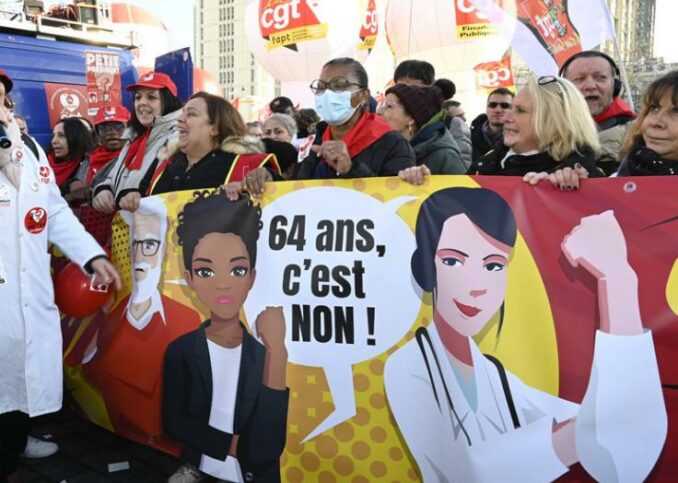Despite government attacks: Workers, students in France stay strong
Since President Emmanuel Macron and Prime Minister Élizabeth Borne rammed through the “reform” of France’s pension system March 16 — an attack which will require workers to work longer to obtain a full pension — the class struggle has grown more intense.

Women retirees on the front lines, March 2023.
Millions of workers struck on March 23 to protest this new law, which extends their retirement age to 64 from 62. The law must still be reviewed by the Constitutional Council, which can reject or modify it.
The new pension law provides fewer protections for workers who have arduous jobs and/or dangerous working conditions. These include sanitation workers, who collect garbage and are exposed to traffic, inclement weather and do heavy, repetitive lifts. It includes refinery workers who need to handle dangerous chemicals and heavy equipment in any weather.
Women, whose careers may be interrupted by child or elder care, get no relief from the new law. Women’s pensions currently average 40% lower than men’s.
On March 23 nearly 3.5 million people protested in over 200 locations, according to the General Confederation of Labor (CGT), which does the counting for the unions. Police estimated the participation at 1 million.
The demonstrations involved many students, inspired by their teachers, and in small cities and towns, like Besançon near the Swiss border. Student unions said that over 500,000 youth participated in March 23 protests.
Demonstrators held signs that called for the following: full retirement at 60; higher minimum wages, as a step for higher wages for all; equal pensions for men and women; and an end to police violence, which has grown sharper since the protests began in January.
The workers’ determination has already affected French diplomacy. France and England had spent months negotiating the new British King Charles III’s visit to France. This visit was to begin March 28, which is coincidentally the day the union coalition scheduled the next, the 10th day of protest/strikes. The CGT announced that its members, who would be responsible for setting up the red carpet and carrying out the services to greet a foreign monarch, would go on strike instead.
With no red carpet to underline the importance of this visit, Paris and London agreed to postpone the visit. The absence of a red carpet would have illustrated the power of the working class.
Garbage collectors
Garbage collectors in Paris went out on strike March 5. Sanitation pickups in Paris are divided by zones; in many of the zones, the workers didn’t strike. Strikes were concentrated in the wealthier and tourist-oriented districts of the city. Not only the collectors who load the garbage trucks are on strike, but the incinerator workers who dispose of it also went out.
Class consciousness is so high these days that when three National Guard members were noticed picking up garbage around their headquarters, the public outcry forced the Minister of Interior to step in and explain that the soldiers were only trying to clear a path in case they had to respond.
When the garbage piled up on Paris sidewalks neared 10,000 tons, the prefect of the Police for Paris — the official directing the national police in Paris — demanded that the Socialist Party mayor send him a list of garbage workers, so he could “requisition” them and force them back to work. Anne Hidalgo, the mayor, refused because she supported the strike. The Ministry of the Interior managed to get a copy of the list, and it forced 674 workers back.
The amount of sidewalk garbage after a few days decreased to about 9,300 tons and then started to creep up toward 10,000 as workers adjusted their work rhythms. Downward.
In militant nighttime demonstrations following union marches, protesters built barricades from this trash and set them ablaze to complicate pursuit by cops on motorcycles.
Refinery workers
Refinery workers, who also face requisitions, have held numerous strike days since this struggle over pensions began Jan. 19. Refinery workers have other special grievances and have been on strike since October 2022.
Combined with strikes in fuel depots where the tanker trucks are loaded, some of the refinery shutdowns led to temporary shortages in gas stations in western and southern France. Lines for fuel have stretched for miles.
According to Alexis Antonioli, secretary general of CGT Total Normand, in the online news source Left Voice, the Paris airports “only have two days of kerosene in pure stock left. They went into downgrade mode. They canceled 30% of the flights. They are asking the medium-haulers to work double-duty. They are in a critical situation.
“The government will do anything to break the strike. They’ll do anything to get kerosene . . . They are completely panicking — the strikes are continuing; the mobilization is strengthening, and the momentum among the youth is growing.”
Management of the refineries tried to negotiate with the strikers, but workers refused to do shift turnovers — the discussions preparing the incoming workers — while requisitions were in force.
The outcome of this struggle around the refineries is still unclear, as the workers develop a strategy to combat requisitions.
A need for solidarity
French workers have a long revolutionary history. As they like to point out to President Macron when he is acting like a king, a particularly self-satisfied king, the last feudal king of France was guillotined during the 1789 Revolution. Macron and his gang are refusing to bargain because the ruling classes of the European Union and North America are united with them against the French unions.
Some explicit class solidarity from workers in other countries could only help the workers in France, whose victory would be a victory for workers worldwide.

